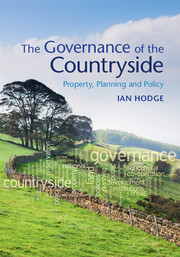Book contents
16 - Conclusions: ecosystem governance and resilient countrysides
from Part V - Conclusions
Published online by Cambridge University Press: 05 February 2016
Summary
Continuing to presume that complex policy problems are simple problems that can be solved through the adoption of simple designs that are given general names, such as private property, government ownership, or community organization, is a dangerous academic approach.
Elinor Ostrom (2005 p. 256) Understanding Institutional Diversity. Princeton University Press, Princeton and Oxford16.1 Introduction
If we think of property as an entitlement to a benefit stream, there is a sense in which we all have some proprietorial interest in the countryside. Even if we do not own land ourselves, we each hold rights of access and we have expectations in terms of our capacity to enjoy landscape, wildlife and living space and to benefit from marketed products, increasingly characterised in terms of ecosystem services. At the same time, landowners hold rights to use their land for their own purposes, free from unreasonable interference. As individual aspirations and social priorities, circumstances and the distribution of power and influence change, rights, duties and incentives are reformed and recast to reflect new situations. There is thus a constant flux along margins of interaction between conflicting aims and interests. As a result, the very nature of property itself is modified over time.
16.2 The shifting dimensions of governance
Governance is the process whereby these aspirations and divergent interests are resolved into rules, incentives and norms that determine outcomes on the ground. There is no single or correct model of governance, but rather a permanently shifting contest between different stakeholders to coordinate their actions and influence the character of the benefit streams that arise from the countryside and to gain access to them. Demands to change the outcomes from this process are pursued at multiple levels constantly and simultaneously: to achieve a legislative body that implements rules sympathetic to particular interests, to influence a government department to approach an issue in a particular way, or to persuade those on the ground to take or not take particular actions. These contests are played out in respect of many different issues, whether it is the public right of access to open land, the ownership of forests, the development of greenfield land for housing or the introduction of fracking. Sometimes new benefit streams emerge or old ones disappear, and the debates surrounding them become distorted or conflated with other issues. Take for example the issue of the control of bovine TB through badger culling.
- Type
- Chapter
- Information
- The Governance of the CountrysideProperty, Planning and Policy, pp. 345 - 355Publisher: Cambridge University PressPrint publication year: 2016



